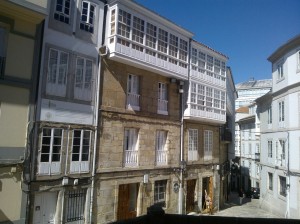Upon embarking as an intern for the international conference, “Cultural Encounters through Reading and Writing: New Approaches to the History of Literary Culture”, due to take place at the Glasgow Women’s Library (9th-11th June), I was interested to see which writers the conference papers would discuss, and naturally, given that I currently study Spanish at the University of Glasgow, my eye was drawn to the Hispanic writers. Despite being in the middle of exams and stuck in the library for hours on end, I researched the conference and began my internship. A closer look at the programme revealed a familiar name from an honours module and a particular favourite author of mine, Emilia Pardo Bazán.
Emilia Pardo Bazán’s house in A Coruña, Spain
The conference paper was entitled ‘The ones that got away: the unfulfilled promises of Pardo Bazán’s Biblioteca de la mujer’. As previously mentioned, I had studied Emilia Pardo Bazán but I hadn’t come across her Biblioteca de la mujer, or women’s library. I did some further reading and a little bit of procrastination, and discovered that the Biblioteca de la mujer wasn’t “successful”. It only featured 12 texts, including cookery books. According to Pilar Faus, Pardo Bazán’s initial goal had been to introduce Spain to the currents of foreign feminism through the translation of books such as The Subjection of Women by John Stuart Mill and August Bebel’s Women under Socialism. Having had little success in capturing the hearts and minds Spanish women with her political and sociological treatises, Pardo Bazán turned to cookery books to ease women into the idea of her ‘Biblioteca’, a series of titles aimed at Spanish women.
The following titles were included in La Biblioteca de la mujer: La Vida de la Virgen Maria (The life of the Virgin Mary) by Ágreda in the religious section, The Subjection of Women by John Stuart Mill and La Mujer ante el Socialismo (Women and Socialism) by August Bebel in the sociological section, Novelas escogidas (Selected Novels) by María de Zayas in the literary section, Reinar en secreto (Ruling in Secret) and La Maintenon by P. Mercier in the Historical section, La Instruccion de la mujer cristiana: tratado de las vírgenes (The Education of the Christian woman: treatise of the virgins) by Juan Luis Vives in the pedagogical section, La revolución y la novela en Rusia (Revolution and the Russian Novel) and Mi Romería (My Pilgrimage) by Emilia Pardo Bazán herself in the literary section, La Cocina española moderna (Modern Spanish Cuisine) by Emilia Pardo Bazán and Bebidas, helados, refrescos, té, café, chocolate (Drinks, Ice Creams, Refreshments, Tea, Coffee, Hot chocolate) by Emilia Pardo Bazán, both in the cookery section.
Initially I found it surprising that Pardo Bazán’s selection of texts went from a translation of John Stuart Mill’s The Subjection of Women to publishing two cookery books, but then I realised that it perfectly reflected a generation caught in the flux of feminist currents that were flowing through Europe at the time. Certainly, that Pardo Bazán began to focus on cookery books does support the general perception that Spanish women in the nineteenth century were an audience more interested in baking than battling the patriarchy. However, the situation was changing, thanks to pioneering women like Pardo Bazán and her European homologues, who were intent on building the connections across Europe that would ultimately form the human framework on which this paradigm change would take place.
My initial application for the conference internship couldn’t have foretold the excitement that I now have for the conference. I have never had the opportunity to be surrounded by so many participants from Norway to Spain to the USA. The passion that they must have with regard to their subject of study is admirable and I can’t wait to talk about their focus of study with them. My main interest was initially Emilia Pardo Bazán but I have now been intrigued by the Swedish writer Selma Lagerlöf, the first female writer to win the Nobel Prize for literature. The conference will allow for many unanswered questions to be answered, personally for me about the Biblioteca, and for others there may be new stories to be uncovered about less widely known female writers that will spark new interest in these women and writers. The fact that the conference will be held in Glasgow Women’s Library is poignant in my interest in Emilia Pardo Bazán’s Biblioteca de la mujer and the physical realisation of an actual Women’s library where the conference will be held. The range of new perspectives to be given light is utterly compelling, I look forward to what else the conference and my internship will bring.
——————————————
Bazan, E. P. (1889). THE WOMEN OF SPAIN. Fortnightly Review, May 1865-June 1934, 45(270), 879-904. Retrieved from http://ezproxy.lib.gla.ac.uk/login?url=http://search.proquest.com.ezproxy.lib.gla.ac.uk/docview/2433063?accountid=14540
Pilar Faus, Emilia Pardo Bazan (Su epoca, su vida, su obra), CONDE DE FENOSA FUND. PEDRO BARRIE DE LA MAZA, 2003
